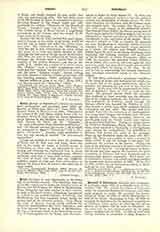

Bernold of Constance, historian and theologian, b. in Swabia about 1054; d. at Schaffhausen, September 16, 1100. He entered the school of Constance under the renowned Bernard of Constance, and made rapid progress in study. He attended the Lenten Synod of Rome, in 1079, at which Berengarius retracted his errors. Remaining in Italy till 1084 he returned to Constance for the episcopal consecration of Gebhard, whose action in enforcing the reform decrees of Gregory YII he later on defended. In the same year he was ordained priest by the papal legate, Cardinal Otto of Ostia. In 1086 he went with Bishop Gebhard as counsellor to King Herman, to the battle of Bleichfeld. About the same time he entered the Benedictine Abbey of St. Blasien in the Black Forest near Schaffhausen, and in 1091 the Abbey of All Saints in the city itself, where he died. His name has ever been associated with the reforms of Gregory VII. The seventeen tracts that have reached us are mostly apologies for the pope’s policy, or vindications of men who advocated or enforced it in Germany. Chief among these are: “De prohibenda sacerdotum incontinentia”, written against the married clergy; “De damnatione schismaticorum”, wherein he justified the pope’s condemnation of that abuse; “Apologeticus super excommunicationem Gregorii VII”, a defense of the pope’s excommunication of Henry IV and his partisans. Bernold is the author of a chronicle (Mon. Germ. Hist., Script., V) which is still highly esteemed. The latter part is a terse record of contemporary events by a knowing and intelligent observer. Dom Morin has shown (Revue Benedictine, VIII, 385-395) that Bernold is the author of the “Micrologus“, an important medieval liturgical treatise. Several other works are ascribed to him, but without sufficient evidence.
THOS M. SCHWERTNER

